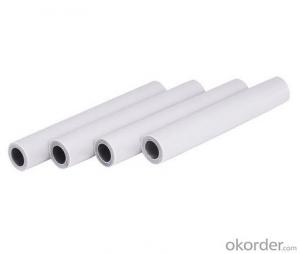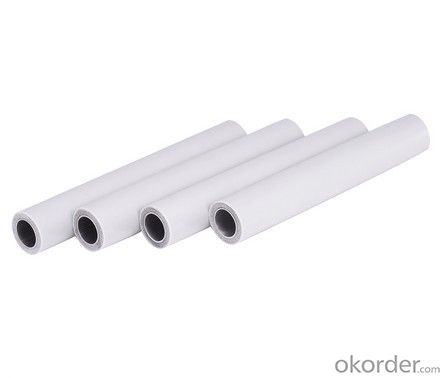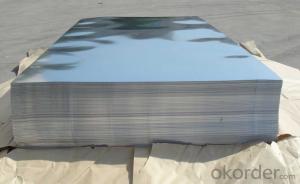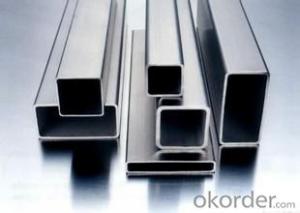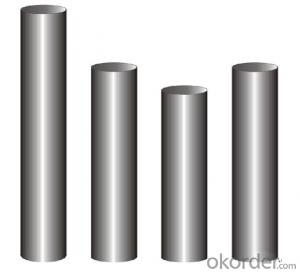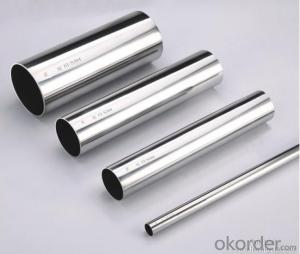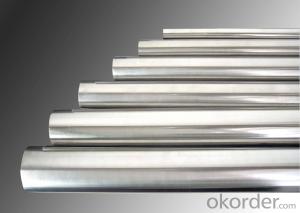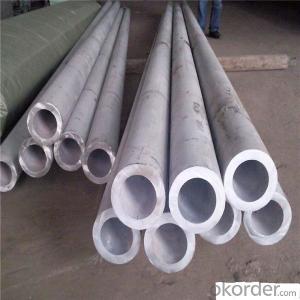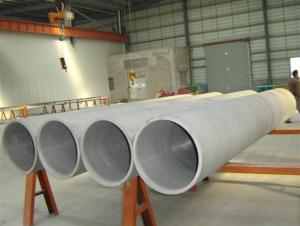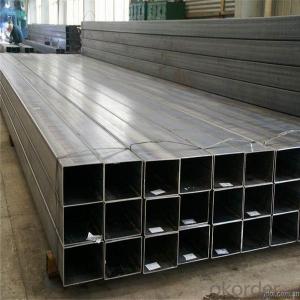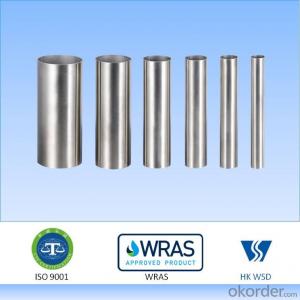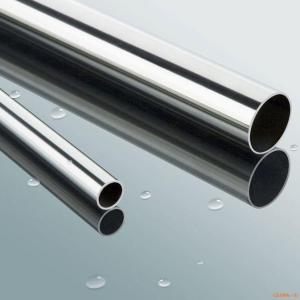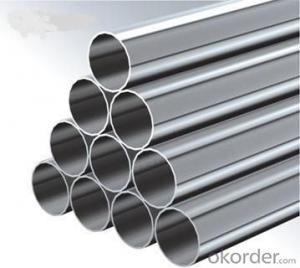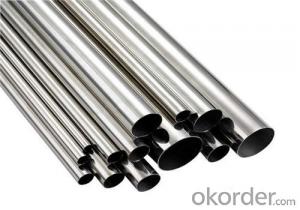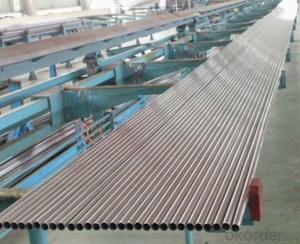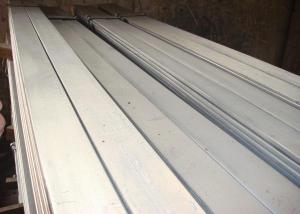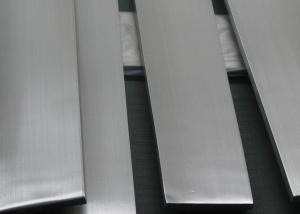Stainless Steel Insulating Pipe Stainless Steel Tube 304/316L
- Loading Port:
- Huangpu
- Payment Terms:
- TT OR LC
- Min Order Qty:
- 100 pc
- Supply Capability:
- 100000 pc/month
OKorder Service Pledge
OKorder Financial Service
You Might Also Like
Specification
WELCOME to visit our products here(^_^)
Press fitting system joins pipe without welding or bolting. The components fit by crimping through the use of a special pressing tool. An O-ring that is inserted in the fitting ends of the pipe ensures a leak-proof connection. Press fitting system is the trend of pipeline industry. It is widely used in cold and hot water supply, heating supply, fire protection, medicinal gas, industrial petroleum pipeline system etc.
For the size, now we have 3 series:
1. Out diameters: 16.0, 20.0, 25.4, 32.0, 40.0, 50.8, 63.5, 76.1, 88.9, 108.0 (GB/T 19228.2-2011)
2. Out diameters: 15.88, 22.22, 28.58, 34.0, 42.7, 48.6, 76.1, 88.9, 101.6 (JIS G3448-1980)
3. Out diameters: 15, 18, 22, 28, 35, 42, 54, 76.1, 88.9, 108 (EN 10312:2002)
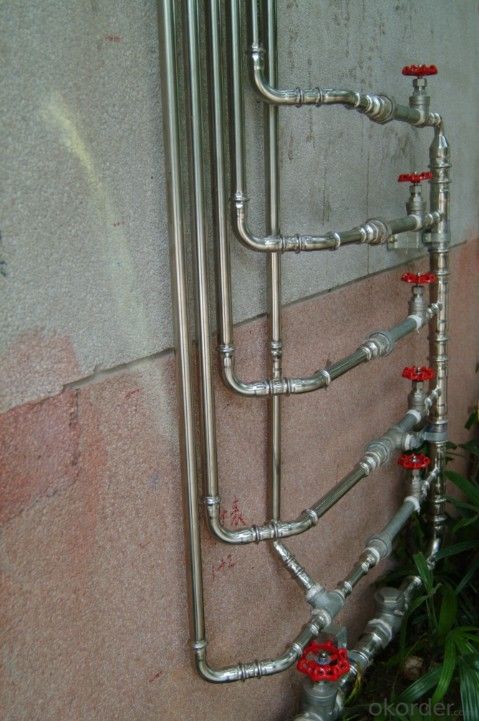
Technical information:
-- Material: Stainless steel 304 and 316L available.
-- Max working pressure 1.6MPa (equal to 232 psi), testing water pressure: 2.5MPa (equal to 362.5psi).
-- Working temperature from -20 to 110 degree centigrade (with Chlorinated butyl rubber O ring),
-- Suit medium: Cold water, hot water, compressed air, gas, oil etc
The product features as below:
1, thin wall stainless steel pipe could last for 70 years, it is the same life time with normal buildings.
2, no smell, no rusty.
3, recycle material
4, avoid welding, avoid fire dangerous.
Contact us for more details!
- Q: Can stainless steel pipes be used in power plants?
- Yes, stainless steel pipes can be used in power plants. Stainless steel has excellent corrosion resistance, high-temperature strength, and durability, making it suitable for various applications in power plants, including transporting fluids and gases, supporting structural components, and handling high-pressure environments.
- Q: What is the difference between 2205 and 2507 stainless steel pipes?
- The main difference between 2205 and 2507 stainless steel pipes lies in their chemical composition and corrosion resistance. While both are duplex stainless steels, 2205 contains 22% chromium, 5% nickel, and 3% molybdenum, whereas 2507 contains 25% chromium, 7% nickel, and 4% molybdenum. This difference in composition provides 2507 with slightly higher corrosion resistance, especially in environments with high levels of chloride ions. Additionally, 2507 stainless steel pipes offer better strength and impact toughness compared to 2205. Consequently, 2507 is often chosen for applications that require enhanced resistance to corrosion and higher strength.
- Q: Can stainless steel pipes be magnetized?
- Yes, stainless steel pipes can be magnetized to some extent. However, unlike ferromagnetic materials such as iron or nickel, stainless steel is generally considered non-magnetic. This is because it contains a high level of chromium, which forms a protective oxide layer on the surface of the steel, preventing it from being easily magnetized. However, stainless steel can still be weakly attracted to a magnet, especially if it has undergone certain processes such as cold working or welding. In these cases, the crystalline structure of the steel may change, allowing it to become slightly magnetic. It's important to note that the magnetism in stainless steel pipes is relatively weak and will not hold or attract other magnetic objects as strongly as ferromagnetic materials would.
- Q: What is the pressure rating of stainless steel pipes?
- The pressure rating of stainless steel pipes can vary depending on several factors such as the grade of stainless steel, the wall thickness of the pipe, and the diameter of the pipe. Generally, stainless steel pipes have high pressure ratings due to the strength and corrosion resistance of the material. However, it is essential to consult the relevant standards and specifications to determine the exact pressure rating for a specific stainless steel pipe. These standards, such as ASME B31.3 or ASTM A312, provide guidelines and calculations for determining the maximum allowable working pressure (MAWP) based on the aforementioned factors. It is crucial to ensure that the pressure rating of the stainless steel pipes is appropriate for the intended application to maintain safety and prevent any potential failures or leaks.
- Q: Are stainless steel pipes suitable for compressed air systems?
- Yes, stainless steel pipes are suitable for compressed air systems. Stainless steel has excellent corrosion resistance, high strength, and can withstand high-pressure conditions, making it a reliable choice for transporting compressed air. Additionally, stainless steel pipes are durable and have a long lifespan, minimizing the need for frequent replacements.
- Q: Can stainless steel pipes be used for swimming pool installations?
- Yes, stainless steel pipes can be used for swimming pool installations. Stainless steel is a highly durable and corrosion-resistant material, making it suitable for use in swimming pool environments where there is constant exposure to water and chemicals. Stainless steel pipes are known for their longevity and ability to withstand the harsh conditions of a swimming pool, including chlorinated water and high temperatures. Additionally, stainless steel pipes are easy to clean and maintain, reducing the risk of contamination or blockages in the pool system. Overall, stainless steel pipes are a reliable choice for swimming pool installations due to their strength, resistance to corrosion, and longevity.
- Q: What is the maximum length of stainless steel pipes?
- The maximum length of stainless steel pipes can vary depending on various factors such as the manufacturing process, the specific grade of stainless steel used, and the intended application. In general, stainless steel pipes can be manufactured in lengths ranging from a few feet to several hundred feet. However, it is important to note that longer lengths may require special handling during transportation and installation due to their weight and potential for bending or damage. Additionally, certain applications may have specific limitations on the maximum length of stainless steel pipes to ensure optimal performance and safety.
- Q: What is the difference between 347 and 321 stainless steel pipes?
- The chemical composition and intended applications are what set apart the 347 and 321 stainless steel pipes. Titanium is added to the 321 stainless steel as a stabilizing element to prevent the formation of chromium carbide during high-temperature service. This feature allows the steel to be utilized in environments where carbide precipitation is likely, such as in the presence of intergranular corrosion. Consequently, the aerospace industry commonly employs 321 stainless steel pipes in applications involving high temperatures and corrosive environments. On the contrary, the 347 stainless steel incorporates columbium and tantalum as stabilizing elements. These elements also hinder the formation of chromium carbide and offer enhanced resistance to intergranular corrosion when compared to 321 stainless steel. Consequently, the oil and gas industry often makes use of 347 stainless steel pipes in applications where there is a concern for high temperatures and corrosive environments. To summarize, the primary distinction between 347 and 321 stainless steel pipes lies in the presence of columbium and tantalum in 347 stainless steel, which provides superior resistance to intergranular corrosion. This characteristic makes 347 stainless steel pipes more suitable for applications involving corrosive environments and high temperatures.
- Q: What is the maximum diameter of stainless steel pipes available?
- The maximum diameter of stainless steel pipes can differ based on the manufacturer and supplier. Nevertheless, stainless steel pipes usually span from smaller sizes, like ½ inch or 1 inch, to larger sizes, such as 36 inches or beyond. It is crucial to acknowledge that obtaining bigger diameters might be restricted and necessitate special orders or customization. It is, therefore, recommended to consult specific manufacturers or suppliers to ascertain the maximum diameter they provide for stainless steel pipes.
- Q: What is the average lifespan of stainless steel pipes?
- The average lifespan of stainless steel pipes can vary depending on various factors such as the quality of the materials used, the environment in which they are installed, and the maintenance practices followed. However, on average, stainless steel pipes can last anywhere from 50 to 100 years or more with proper care and maintenance.
Send your message to us
Stainless Steel Insulating Pipe Stainless Steel Tube 304/316L
- Loading Port:
- Huangpu
- Payment Terms:
- TT OR LC
- Min Order Qty:
- 100 pc
- Supply Capability:
- 100000 pc/month
OKorder Service Pledge
OKorder Financial Service
Similar products
Hot products
Hot Searches
Related keywords
